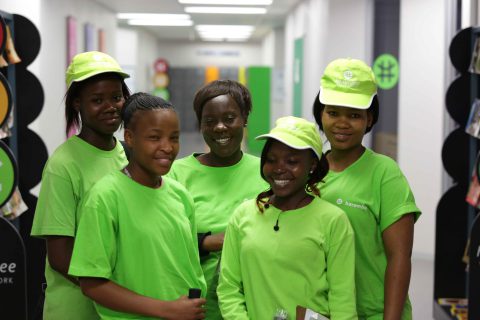Sunday Times Skills
The New Digital Interns
Technology, the internet and digital tools are no longer just “nice-to-haves”; they are “must-haves” for young people entering the working world. From banking and finance to taxis and home décor, there is no industry that isn’t undergoing digital transformation of some sort, and our workforce is dramatically short of the skills to capitalise on this.
The horrible truth is that, while the World Bank estimates youth unemployment in South Africa to be higher than 50%, the Johannesburg Centre for Software Engineering (JCSE) reckons there are at least 40 000 vacancies in fields such as software and application development, cloud computing and information security unfilled. Some put that figure at 70 000.
The challenge is that, among those unemployed, Stats SA says 55% have education levels below a basic matric certificate, while an additional 36.4% have only a matric qualification.
More must be done. “Exposure to and familiarity with ICTs for all learners is essential, in order to equip them to adapt the modern tools to their daily lives,” the JCSE states.
There are plenty of programmes emerging to address the digital skills gap. Some of the most innovative come from the private sector.
In October 2015, Standard Bank launched the Quad Digital Academy. What makes Quad unusual is its interdisciplinary approach: instead of focusing just on ICT workers, it looks to train workers across the board with the skills they need to innovate.
“We recognised the need, both within our company and in Africa in general, to develop high-calibre digital talent and overcome the digital skills shortage. So, our curricula are focused on four areas: design, development, data and digital product management,” says Sarah Stokes, from Standard Bank’s Innovation Banking department.
“Unlike many product-focused incubators that develop small businesses around a great idea, Quad is focused on the individuals themselves,” Stokes continues. “In this way, we could describe it as an ‘incubator of minds’. We hope to infuse the concept of ‘digital’ into the DNA of our organisation.”
Quad Academy attendees receive the guidance and the practical tools, which they are then able to apply in driving better collaboration within teams and enhanced user-centricity for customers.
New techniques
Arlene Mulder, a former investment banker, runs a coding academy in downtown Johannesburg called WeThinkCode_. Its two-year courses are free and entry isn’t based on academic achievements. In order to be open to all, prospective students must undertake basic aptitude tests, followed by a “bootcamp” induction. This means Mulder is able to find students from disadvantaged backgrounds who could be genius developers, regardless of their CV.
“Aptitude is equally distributed all over the world, but opportunity isn’t. That’s especially true in a country like South Africa, where few have access to high-quality education, and that’s what we’re trying to change,” Mulder says.
WeThinkCode_’s model is based on a French programme called 42, which has trained thousands of young Europeans.
WeThinkCode_ partnered with a number of South African businesses across different sectors, including corporate, retail and hospitality, to offer participants internships. These internships not only give students experience with real-life work environments and problems, but they aim to help them to get a foot in the door, which may lead to permanent employment.
The 42 methodology of skills development is as different to traditional models as its recruitment processes too. There are no scheduled classes, timetables or even teachers. Everything is based on peer-to-peer learning, where participants come together to leverage off each other’s strengths and knowledge, to complete a number of tasks and solve problems using coding.
“I believe this is the future of education; it’s not a teacher standing in front of a class and telling learners they have to think in the same way, within the same box. It’s revolutionising the way education works.”
There are bright spots of public-sector success too.
The City of Joburg municipality is an example of government’s own interventions in providing access to digital skills. Last year, it launched a 10-month programme called City of Joburg Educating Digital Interns (COJEDI), which trains 250 young citizens between the ages of 18 and 35 per term, taking them through three months at technical bootcamp, one month of soft-skills training and six months of integrated learning at a leading digital enterprise workspace.
Participants are trained in web development, fibre optics, Microsoft Systems Engineering and Cisco Network Associates, in a bid to arm them with skills and knowledge they can apply in ICT careers.
These programmes are pointers to the shift towards a focus on digital skills in the country. They are, however, the proverbial drop in the ocean, as much more needs to be done, from the grassroots of education upwards, in order to truly bridge the digital skills gap.
Closing the gender gap
Even more desperate is the need to make sure women and girls are no longer marginalised and discriminated against, but are given access to the same opportunities as males.
According to the Women and the Web report, commissioned by Intel Corporation in 2013 and in consultation with the US State Department’s Office of Global Women’s Issues, UN Women and the World Pulse women’s network, almost 43% fewer sub-Saharan women and girls are online compared to men and boys.
Intel’s answer to this is She Will Connect, a global initiative launched first in sub-Saharan African countries in 2013 to bridge the gender digital divide. She Will Connect aims to reduce the internet gender gap around the world by bringing 1.2 billion girls and women online, through a combination of digital literacy training, an online peer network and gender-relevant content.
The goal for Africa is to reach five million girls and women.
*As part of its resources for developer training, Microsoft has launched its own Virtual Academy, filled with online learning materials, free of charge. Modules range from “Build a 2D game” to “Big Data and Machine Learning”.





 Sign-up and receive the Business Media MAGS newsletter OR SA Mining newsletter straight to your inbox.
Sign-up and receive the Business Media MAGS newsletter OR SA Mining newsletter straight to your inbox.